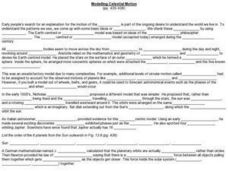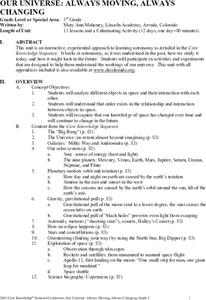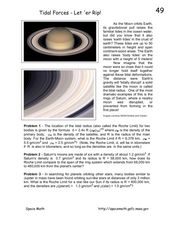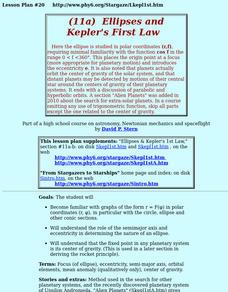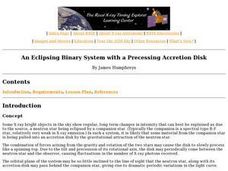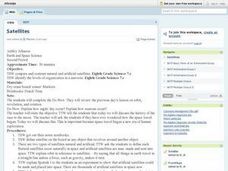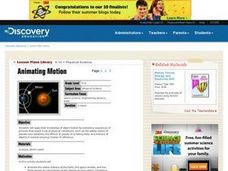Curated OER
Modeling Celestial Motion
In this modeling celestial motion instructional activity, students fill in the blank about the motion of celestial bodies: planets and stars. Students complete the blanks with information about the scientists and philosophers responsible...
Curated OER
Volcanoes are a Blast-Working with Simple Equations
In this projectile motion worksheet, students solve 3 problems and an inquiry problem using three equations that describe projectile motion. One equation is for the maximum velocity to reach a height, H, the other is the maximum...
Curated OER
Weightlessness
Learners predict the behavior of coffee in a cup while it is dropped during a demonstration. They relate their observations to the weightless conditions that astronauts experience in space and discuss the concept of free-fall.
Curated OER
Our Universe: Always Moving, Always Changing
Students explore the main concepts of astronomy through the eleven lessons of this unit. The past, present, and future methods of studying the science are examined in this unit.
Curated OER
Motion Through the Ages
Eighth graders conduct internet research to produce a timeline of man's growth in understanding of concepts of motion and planetary motion through history.
Curated OER
The Solar System and the Forces Behind It
Sixth graders discover why planets stay in orbit. In groups, they use everyday materials to examine the effect of gravity of objects and calculate how mass changes based on gravitational pull. To end the activity, they discuss how...
Curated OER
Interstellar Real Estate - Defining The Habitable Zone
Students explore the orbital characteristics a planetary home needs to support Earth-like life forms. They develop an understanding of critical planetary mass to determine which newly discovered planets might be capable of supporting life.
Curated OER
Solar System
Eighth graders identify the basic concepts of celestial bodies. They discover the difference between perihelion and aphelion and demonstrate how the universe is expanding. They also discover how gravity and centrifugal force are...
Curated OER
Constellations
Middle schoolers explore the major constellations. After reviewing the Earth's basic motions and their significance, students discuss the moon's orbit and revolutions. Using a Digitarium Alpha portable planetarium projector, they...
Curated OER
Forces and Acceleration Unit
Students investigate that an unbalanced force, acting on an object, changes it speed or path of motion or both, and know that if the force always acts toward the same center as the object moves, the objects path may curve into an orbit...
Curated OER
Black Holes....II
In this black hole worksheet, students use the equation for time dilation to solve 8 problems including determining the time it takes to receive a GPS signal from space, the time delay for the GPS-Earth system, the distance a radio...
Curated OER
Tidal Forces-Let'er Rip!
In this tidal forces worksheet, students read about the gravitational pull from the moon that causes the ocean tides. Students solve 3 problems including finding the Roche or the tidal radius for the Earth and Moon, comparing the Roche...
Curated OER
Is There a Tenth Planet?
For this planets worksheet, students read about how our solar system's planets were discovered and how scientist believe there might be a tenth planet. After reading, students complete 4 short answer questions.
Curated OER
Ellipses And Kepler's First Law
Learners explain that planets actually orbit the center of gravity of the solar system, and that distant planets may be detected by motions of their central star around the centers of gravity of their planetary systems.
Curated OER
Kepler's Second Law
Students explore orbital velocities and how they vary along each orbit, according to Kepler's Second Law.
Curated OER
An Eclipsing Binary System with a Precessing Accretion Disk
Young scholars work together to complete an experiment over binary sources. They determine values for the orbital period of certain objects and interpret intensity changes. They also calculate a value for the period of precession of an...
Curated OER
Satellites
Eighth graders explore the history of space travel and satellites. Through a teacher demonstration, 8th graders observe how a satellite revolves another object. They identify natural and artificial satellites, explore how satellites...
Curated OER
Animating Motion
Students apply what they recall about objects in motion by animati ng sequences of pictures that model a set of physical conditions. They animate the orbital motions of the Earth, the space shuttle, and the Moon based on calculations of...
Curated OER
LIFE IN SPACE Human Body: An Un-Earthly Home
Students examine an effect of zero gravity on the human body using a baby food jar, balloons and a jar with a large mouth.
Curated OER
Water and Ice
Students explore the physical properties of water. In this water lesson, students observe, measure, and describe water as it changes state. There are 2 extensions for this lesson that one can access via the Internet links provided.
California Academy of Science
Kinesthetic Astronomy: Birthday Stars
Space explorers take a virtual trip around the sun right within your classroom! They stand in a circle facing away from the "sun" (a lamp) in the center of the room. As they move according to your instructions, they view different...
Curated OER
Suited for Space
A fantastic lesson on survival in outer space should excite your learners! Pupils explore the challenges that living, working, and surviving in space elicit. They focus on the spacesuit itself; how it protects astronauts, and enables...
Curated OER
Mars
After reading a short excerpt about the planet named after the Roman god of war, Mars, your class will answer four comprehension questions. The activity challenges them to fold over the paper and answer the questions without referring...
New Mexico State University
Lab 6: Kepler's Laws
A 15-page package thoroughly teaches your physics or astronomy learners about Kepler's three laws of planetary motion. Each one is stated and explained. Class members answer questions, solve problems, and participate in the classic...


